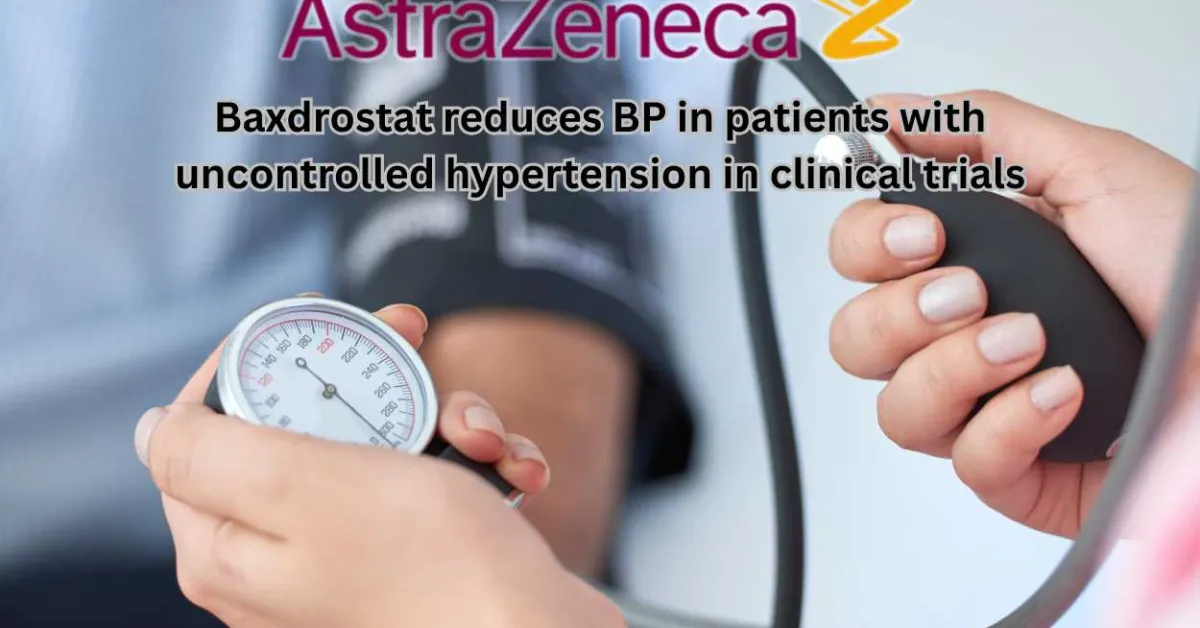Positive full results from the BaxHTN Phase III trial showed AstraZeneca's baxdrostat, demonstrated a statistically significant and clinically meaningful reduction in mean seated systolic blood pressure (SBP) at two doses (2mg and 1mg) compared with placebo at 12 weeks. Results were seen in patients with hard-to-control (uncontrolled and resistant) hypertension who received baxdrostat or placebo on top of standard of care.
These data were presented today in a Hot Line session at the European Society of Cardiology (ESC) Congress 2025 and also simultaneously published in the New England Journal of Medicine.
Baxdrostat is a potential first-in-class, highly selective aldosterone synthase inhibitor (ASI) that targets one of the hormones driving elevated blood pressure and increased cardiovascular and renal risk. It is currently being investigated in clinical trials enrolling more than 20,000 patients globally, as a monotherapy for hypertension and primary aldosteronism, and in combination with dapagliflozin for chronic kidney disease and hypertension, and the prevention of heart failure in patients with hypertension.
Baxdrostat met the primary and all secondary endpoints in the BaxHTN Phase III trial, delivering meaningful and sustained blood pressure reductions in patients with hard-to-control hypertension. At week 12, the absolute reduction from baseline in mean seated SBP was 15.7 mmHg (95% confidence interval [CI], -17.6 to -13.7) and placebo-adjusted reduction was 9.8 mmHg (95% CI, -12.6 to -7.0; p<0.001) for the 2mg dose. For the 1mg dose, the absolute reduction from baseline was 14.5 mmHg (95% CI, -16.5 to -12.5) and placebo-adjusted reduction was 8.7 mmHg (95% CI, -11.5 to -5.8; p<0.001). The reduction in mean seated SBP with placebo was 5.8 mmHg (95% CI, -7.9 to -3.8). Results were consistent across both uncontrolled and treatment-resistant subgroups.
Baxdrostat was generally well tolerated with no unanticipated safety findings, and low rates of confirmed hyperkalaemia (>6 mmol/L in both dose groups [1.1% each]) compared with placebo (0.0%). The safety profile of baxdrostat was consistent with its mechanism of action, and most adverse events were mild.
The trial also met all confirmatory secondary endpoints with baxdrostat. This included demonstration of durable long-term blood pressure reduction with baxdrostat 2mg. Both 2mg and 1mg doses also led to greater reductions in diastolic blood pressure and nearly tripled the odds of patients reaching their target SBP <130 mmHg compared with placebo.
In a prespecified exploratory analysis of a subgroup of patients, baxdrostat meaningfully reduced 24-hour and ambulatory nighttime SBP compared with placebo, key indicators of sustained blood pressure control and reduced cardiovascular risk. The 2mg dose lowered 24-hour SBP by 16.9 mmHg (95% CI, -25.6 to -8.3), and the pooled 2mg and 1mg doses lowered nighttime SBP by 11.7 mmHg (95% CI, -19.5 to -3.8). The Bax24 Phase III trial, evaluating 24-hour ambulatory effects, is expected to read out later this year.
Dr. Bryan Williams, Chair of Medicine at University College London, primary investigator, said: “Achieving a nearly 10 mmHg placebo-adjusted reduction in systolic blood pressure with baxdrostat in the BaxHTN Phase III trial is exciting, as this level of reduction is linked to substantially lower risk of heart attack, stroke, heart failure and kidney disease. These data show that aldosterone plays a greater role in hard-to-control hypertension than previously recognised, underscoring the importance of baxdrostat’s novel mechanism of action, and potential impact for the millions of people living with hard-to-control hypertension despite being on multiple treatments.”
Sharon Barr, Executive Vice President, BioPharmaceuticals R&D, said: “The BaxHTN Phase III results demonstrate baxdrostat’s potential in tackling one of the toughest challenges in cardiovascular care, which is hypertension that is hard to control despite multiple therapies. We look forward to advancing our regulatory filings for baxdrostat with health authorities in the months ahead, in addition to rapidly progressing a robust clinical development programme across indications where aldosterone plays a key role, including chronic kidney disease and heart failure prevention.”
There are 1.3 billion people worldwide living with hypertension. In the US, approximately 50% of patients living with hypertension on multiple treatments do not have their blood pressure under control. Aldosterone dysregulation is increasingly recognised as one of the key biological drivers of the disease, contributing to elevated cardiovascular and renal risk. A large meta-analysis found that lowering systolic blood pressure by 10 mmHg can reduce the risk of major adverse cardiovascular events by around 20%,5 underscoring the urgent need for new treatments that target hypertension at its source.














